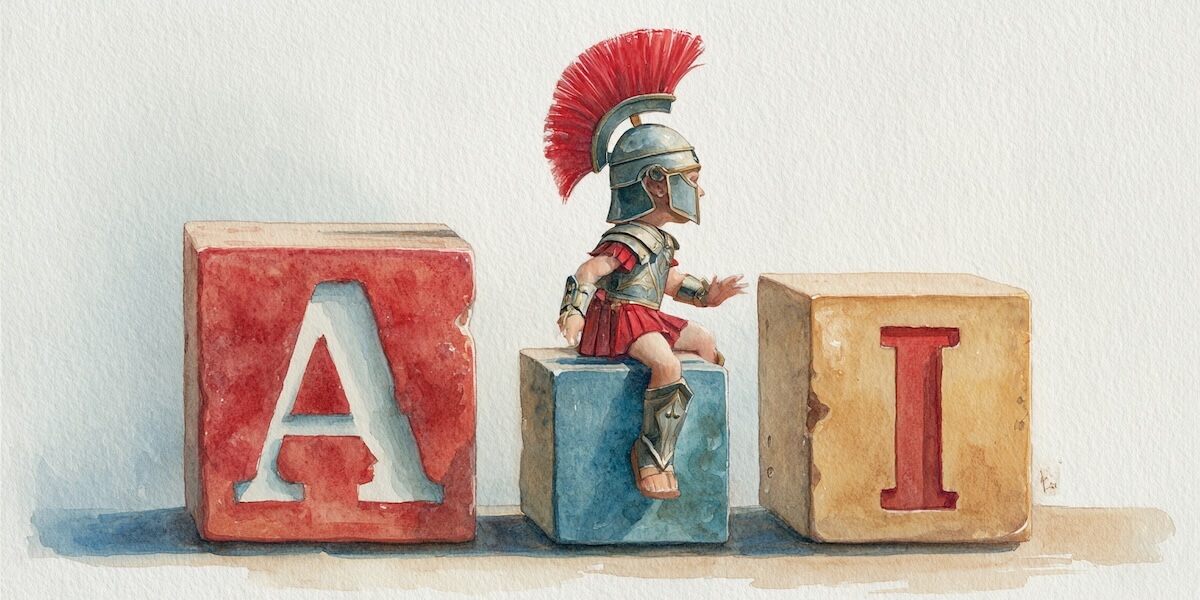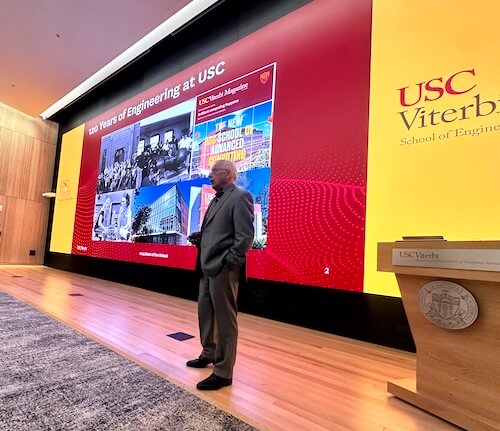
(Image/Courtesy of MidJourney)
In his annual State of the School address, Dean Yannis C. Yortsos discussed the USC Viterbi School of Engineering’s major accomplishments, milestones and challenges over the past year. They include the strength of the entering class, new faculty, new research accomplishments and distinguished faculty awards. The dean then talked briefly about the financial challenges faced in view of university mandates and then spoke of the looming centrality of artificial intelligence and how USC Viterbi is responding to it.
In his Sept. 18 address at the Dr. Allen and Charlotte Ginsburg Human-Centered Computation Hall, Yortsos started by celebrating several important milestones and achievements:
USC Viterbi’s first-year students come from 35 states and 20 countries. The school’s acceptance rate was 9.2%. One-third of the entering class had a perfect 4.0 unweighted GPA. And for the seventh year in a row, the entering class has reached or neared gender balance.
During the past year, USC Viterbi has hired several excellent new faculty members, including eight tenure-track assistant professors, two tenured associate professors, who joined Viterbi from other institutions and one tenured full professor, also from a top peer institution. A record 2,357 applicants vied for these positions.
USC faculty members won several prestigious awards. Andrea Hodge was named an ASM Fellow; SK Gupta won the Society for Manufacturing Engineers (SME) Eli Whitney Productivity Award and the ASME William T. Ennor Manufacturing Technology Award; Azad Madni landed the Society of Women Engineers (SWE) Rodney D. Chipp Memorial Award; Stacey Finley received the BMES Mid-Career Award; and Maja Matarić received the ACM Eugene L. Lawler Award for Humanitarian Computing and the MassRobotics Medal. Earlier this year, Matarić was also inducted into the National Academy of Engineering, the most prestigious award for an engineer.
The School of Advanced Computing – USC’s 23rd school – celebrated its one-year anniversary. SAC aims to leverage physical, chemical, biological and social phenomena with advanced computing, especially AI, with the goal of helping to solve the grand challenges of our times. The new school, a unit within USC Viterbi, serves as the epicenter of all computing-related activities across USC.
The Engineering in Society Program (EIS), focused on equipping engineers with the communication, ethics, empathy and leadership skills, expanded its curricular and co-curricular offerings. New courses such as “EIS 103: Information Literacy;” “EIS 370: Ethical Issues in Artificial Intelligence;” and study-abroad courses in Germany, Japan and Australia reflect the Viterbi School’s belief that engineers must be global citizens and ethical communicators.

Dean Yannis C. Yortsos at the State of the School (Photo/Courtesy of USC Viterbi)
USC Rocket Propulsion Lab celebrated its 20th anniversary this year. In 2019, RPL became the first student-led group to design, build and successfully launch a rocket, Traveler IV, past the Kármán line — the recognized boundary of space at 100 kilometers above Earth. And last October, RPL broke its second world record, when Aftershock II became the world’s first amateur -built rocket to reach 470,000 feet.
The Daniel J. Epstein Department of Industrial and Systems Engineering continues to grow in size and quality and was ranked nationally in the top 10.
The Mork Family Department of Chemical Engineering and Materials Science, which brought together chemical engineering, materials science and petroleum engineering, marked the 20th anniversary of its naming.
For the past 33 years, Hank Koffman, a USC alumnus with a bachelor’s degree in civil engineering, has directed USC Viterbi’s Construction Management Program. Now, thanks to a generous naming gift from his former student, Jonathan Emami, MCM ’06, the program will reach new levels of excellence, with plans to add new faculty, students, and new programs. Emami, a successful real estate developer, named a chair in his mentor’s honor: The Henry M. Koffman Endowed Chair in Construction Management. “This is about legacy and recognizing Hank’s important contributions,” Yortsos said.
In the second part of his address, Yortsos shared his views about the type of engineers that are likely to flourish in the new AI era, which some call “The Age of Intelligence.” Yortsos stated that such engineers should possess three attributes: a deep domain knowledge of their respective fields, a deep understanding of AI technologies and an outstanding character. “They must have purpose and character in addition to technical competence, in a combination that leads to trustworthiness, sorely needed in today’s complex world” he said.
Yortsos said USC Viterbi is committed to educating engineers who will not only leverage the many opportunities created by AI but who will do so without “compromising the well-being of society and humanity.” Simply put, these engineers will play an integral role in harnessing the power of artificial intelligence while ensuring that the technology is “honest, harmless and helpful.”
According to Yortsos, the essential purpose of engineers is to solve problems that can be classified as belonging to four buckets, namely advancing sustainable prosperity, improving health, ensuring security and enriching life. Together, these comprise what he termed a “Maslow hierarchy for humanity.” These will remain constant. At the same time, advanced computing and AI are “changing very fast, like approaching a singularity, much faster than an exponential.”
<>
In a play of the combination of what remains constant and what changes fast, Yortsos devised a schematic equation that combines the Maslow hierarchy triangle for humanity and the hyperbola denoting the singularity to produce a new “double helix,” representing the extraordinary intertwining of technology and society as never before.
He further said that ”humanity is going to provide the trustworthiness and human values needed to ensure that technology is human-centric, that it is regulated and shaped by the human in the loop.” In other words for AI to be “honest, helpful and harmless.”
USC Viterbi, Yortsos added, has recently undertaken several important AI initiatives to strengthen its leadership in the field. The Viterbi School just announced a new B.S. in artificial intelligence, the first undergraduate program of its type on the West Coast, along with a new master’s degree in aerospace and mechanical engineering, with an emphasis on AI and machine learning. Viterbi also helps run the USC-wide Center for Generative AI and Society. Finally, Yortsos said that all engineering courses would soon include fundamental elements of the technology underpinning artificial intelligence.
Published on September 24th, 2025
Last updated on September 24th, 2025
